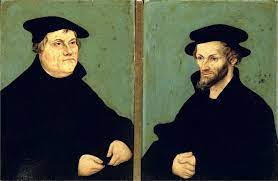Yesterday I preached the Sunday sermon. One member kindly told me it was too subtle. On reflection, I agree. Here, I’ll try to be more explicit.
I titled my sermon “Real life leaders.” I spun the title from the text, from news headlines, and from my soul.
Choosing a title is difficult. I rejected many titles which suggested themselves. One which didn’t make the cut is “Sin boldly.”
“Sin boldly” suggested itself because in my sermon I mentioned it. It’s one of the most abused of the many terms coined by Dr Martin Luther.
“Sin boldly” is a medicine Luther prescribed. Like all medicines, it can be misused, it can be mis-prescribed. I feared to prescribe it.
Luther didn’t say “sin boldly” in a sermon, pamphlet, or theological treatise. He said it in a letter. To Melanchthon, one of his closest friends.
Melanchthon was a much sought after scholar and professor. Wittenberg university built a lovely home for him to induce him to remain on staff.
Melanchthon was architect and builder of the post-reformation national education system.
Melanchthon was a follower of Luther. It’s not far of the mark to say Melanchthon regarded Luther as his guru.
Melanchthon was devoted to Luther. But they disagreed on many things.
For example, Luther hated astrology; Melanchthon loved astrology. Luther was a rough ox; Melanchthon was a quiet dove.
Luther loved Melanchthon. Depended on him. Encouraged him. Corrected him. Politely.
That last word is important. Luther is famous for polemics, for calling people names.[1] “Polite” is a word rarely used of Luther.
Politely, Luther urged Melanchthon to “sin boldly.” Here it is, in context:
If you are a preacher of Grace, then preach a true, not a fictitious grace; if grace is true, you must bear a true and not a fictitious sin. God does not save people who are only fictitious sinners. Be a sinner and sin boldly but believe and rejoice in Christ even more boldly. For he is victorious over sin, death, and the world. As long as we are here, we have to sin. This life is not the dwelling place of righteousness but, as Peter says, we look for a new heaven and a new earth in which righteousness dwells…. Pray boldly—you too are a mighty sinner. (Emphasis added.)
Why did Luther write “sin boldly” to Melanchthon?
As I said yesterday, Wittenberg, where Luther and Melanchthon lived, burned with violence against Roman Catholic priests and practices.
Mobs burned paintings, icons, confessionals (the booths in which priests heard peoples’ confessions and gave absolution).
If Melanchthon had spoken against the burnings, the mobs would’ve listened to him, for he was a well-known “voice of Luther.”
But Melanchthon said and did nothing. He was paralysed. By uncertainty. By fear that his actions might cause greater harm.
Luther got wind of what was happening while he was confined in Wartburg castle, for his own safety, on order of Elector Frederick, his protector.
Luther knew Melanchthon could act to calm the storm. Luther knew Melanchthon was paralysed. Luther prescribed medicine: “sin boldly.”
What does all that have to do with us today?
God calls us to be his co-workers, to make real the Kingdom of God on earth: he calls us to action, among our neighbours, in the world.
Our neighbours include politicians, kings, preachers, laypeople, of all faiths. There’s so much division within and between groups.
We feel paralysed. We encounter passages like my Sunday text, 1 Samuel 16:1-13, which is about Samuel anointing David as king.
We remember how Jesus’ demonstrated leadership. He washed his disciples’ feet. He showed that leadership is servanthood. (John 13)
But we prefer the anointing stories. The stories of immediate action by God. Of the commissioning of a heroic leader.
We miss the point that we’re the ones God calls to action. We’re the ones he anoints today.
The newly anointed are not heroic leaders like David. We are the newly anointed, we whom Jesus calls to be the salt of the earth (Matthew 5:13).
As I said yesterday, Dietrich Bonhoeffer, says very well what we must do:
The Church is the Church only when it exists for others … not dominating but helping and serving. It must tell men of every calling what it means to live for Christ, to exist for others.
Like salt, we are to serve, to penetrate, to confront the world, to model God-approved leadership. In society, with all its differences.
Salt doesn’t wait for instructions. Isn’t paralysed. Acts boldly. Sins boldly. Because it prays, loves, and rejoices boldly.
Bonhoeffer challenges us to ask, “how do we tell others what it means to live for Christ, to exist for others?”
I gave a sample of “others” in my sermon: politicians, rulers, priests, followers.
Their voices say: Keep politics (societal questions) out of religious places! Transfer ownership of aboriginal land to the monarchy! Privilege one ethnic group! Allow tax breaks for political contributors! Stifle protest!
Where’s the voice of churches? What do we hear in sermons, statements, letters? Is there paralysis? What would Dr Luther prescribe?
Can we sin boldly together? Has the salt lost its anointing?
[1] Years ago, after reading a bit of Luther, I asked a seminary principal why seminaries (schools which train pastors) don’t teach polemics. He said some seminaries teach “rhetoric,” and polemics is included in rhetoric. I’ve examined the catalogues of courses in several Malaysian seminaries. Rhetoric isn’t included.
To learn more about Rama, click here.


